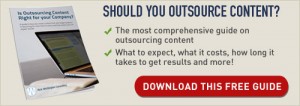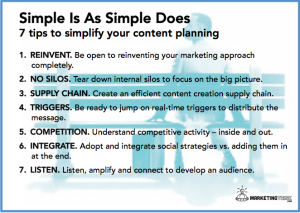The Trust Insights CEO talks about her love of data, co-founding her company and the challenges she’s faced being a woman in technology.

Contributor Katie Robbert is the CEO and co-founder with Chris Penn, of Trust Insights, a marketing analytics agency. She’s an authority on compliance, governance, change management, agile methodologies and dealing with high-stakes, “no mistakes” data. Before Trust Insights, she built and grew multi-million dollar lines of business in the marketing technology, pharmaceutical and healthcare industries. Interviewing Katie reminded me of an old Texas expression of deep respect: “If she tells you a rooster can pull a train, just buy a ticket and get on board.” As in, you may not understand this thing, but she does and she is one who knows. (Interview edited for length and clarity.)
Q: Why is data so fascinating to you?
A: I love understanding what makes people tick, why they make the decisions that they make. When I was learning about product management, I really got interested in the market research side of things because it was just another layer of understanding people. What do people want? How can we best help them? And the data tells a lot of that story. The data point supplements the narrative around our customers, our audience. Without the data, you’re kind of guessing. I’m someone who likes things nice and clean and tidy buttoned up, a little bit of a perfectionist.
Q: How did you and Chris Penn meet?
A: Chris was the VP of the team I got brought in as the director of at this PR agency. And he was experimenting with machine learning and AI. This was about 2015, 2016, and he introduced predictive analytics to our team.
We all just kind of sat there wide-eyed. We’d heard terms [he was using], but we’d never actually seen them in practice, especially not in marketing. And so the team got really interested. The team was highly technical, more than just like your typical marketing team. They got deep into the technical understanding and coding. And me coming from a development background, I could understand that side of it.
So I could understand what Chris was doing and where he was going with it. We started to see there was more of a hunger for it, people wanting those deeper, more thoughtful insights that were more accurate, more telling, more actionable than what they were getting.
Unfortunately, the PR agency just wasn’t aligned with that. They were more, “Let’s look at impressions and let’s look at coverage trackers, and let’s do things manually.” And we were trying to automate a lot of these things to move them faster.
We wanted to go where we saw the industry going and what clients wanted, so our hands were tied by the agency. Then, the only way to do what we wanted to do was to start our own thing.
Q: How did Trust Insights get started?
A: Chris says it got started over a plate of sketchy sushi in Santa Clara. We were visiting a client in 2017 and both burnt out from the work. He was on the road 50 weeks a year doing new business pitches, the dog and pony show, but not for the services, the martech that we could be selling. I was working long hours and I wasn’t really getting quality time with my family and he wasn’t either.
A group had approached him and said, “We’re thinking about making you an offer to bring you on as a partner.” He told me this while we were having dinner at the hotel and was like, “I think I might explore it.” Now I’ve never been shy about saying when I want to be included in a thing and I looked him in the eye and said, “You’re not going to do that. You’re going to start a company with me, let’s talk about that instead.” So we did.
I had always wanted to be my own boss, and I’d never really seen the path forward of what that would look like. But when I started working with him, I was like, we work well together. We know our roles. I think we could do something here.
People want the Chris Penn experience and I don’t want to be on the front line. So I can manage that. I’m not an extrovert. I am very much behind the scenes, and I’m very happy doing that. And he needed to partner with someone who was okay with that because he was always going to be in the spotlight.
So when I thought about the success that we were having with the marketing tech team at the agency, I thought, “We could do this for ourselves, but make our own rules. We could probably figure out what this looks like. And I think I’m ready to be in charge.”
Q: You seem like a natural at that.
A: From birth, I’ve needed to be in charge. There’s stories about me getting kicked out of kindergarten because I refused to let the teacher teach. I thought, well, if she can do it, I can do it. And then my dad got called every single day to come pick me up.
So I’ve always been, “Well, why not me?”
That’s always been the challenge in my career. It’s like, I’ll be at this level, and I’ll see people up here. And I know I can do that better. Then I’d go to my managers and say, “Can I go do that?” And they’re like, “You need to stay in your lane.” Quite honestly, I was tired of being told you’re not ready, stay in your lane, you haven’t been in this seat long enough.
And I’m like, I can run circles around these people. Just let me do the thing.
Q: How have men responded to that?
A: I’ve been complained about a lot. At the time, it was scary because I was like, “Oh, oh, I need to I need to be less, I need to tamp it down. Let me stay in my lane so I can keep my job.” Looking back, those were the times I needed to be more, not less.
It’s not that I’m always right. I’m the first person to say I have a lot to learn, but I’m not afraid to speak up and say, “I don’t think this is going in the right direction. We need to do something about it.”
Unfortunately, a lot of my career was dictated by people saying you don’t know what you’re talking about. I remember when I was a product manager, the vice president of sales and marketing, we were oil and water. We did not get along for a variety of reasons. I didn’t like him because he didn’t remember the URL for the product that he was supposed to be selling, which was five letters long. He didn’t know what it was and I knew the product inside and out. I helped develop it through clinical trials, and I said, “Hey, I would love to sit down on some of your sales calls.”
And I remember him saying to me, “You can sit in on sales calls when someone of your level is also on those calls.” I was like, “What does that mean?” He goes, “Well, if there’s a project manager” — I was a product owner, not a project manager — “If there’s a project manager on those calls, then you can be on them, too.”
And I was like, “I really don’t understand.” He thought I was being difficult, but I was genuinely confused about what that had to do with anything. And it was just that kind of you need to stay in your lane. You don’t have enough authority for this. You’re not smart enough. You’re not [the right] gender.
All through my career, I’ve been told what I should wear, how I should look, how I should act. I remember sitting in interviews for new roles, and my boss at the time told me, “You need to soften your body language. You look aggressive.” I didn’t even know what that meant. And so, I’ve been dealing with it.
Even in my role now, I still deal with it, because in public and large crowds, I tend to get very quiet and just sort of like take it all in. And there have been a lot of times when people will address me while I’m standing next to Chris and ask if they can have access to his calendar and if I can set something up. They think I’m his assistant because I’m not saying anything.
I ran into this recently with a client. I have extensive development and business analyst experience and they’re looking for some support with that. We were talking with them, and the head of IT goes, “So Katie would you be able to take this on full-time for us?” And I tried to very respectfully say, “I don’t have full-time availability because I run a company. But I’m happy to look at what your needs are.”
In my head, I was like, “Are you kidding me? Would you have asked Chris the same question?” And, no, they wouldn’t. So I still get it all the time, and it’s frustrating.
The post Katie Robbert: Spotlight on the expert appeared first on MarTech.
(9)
Report Post





